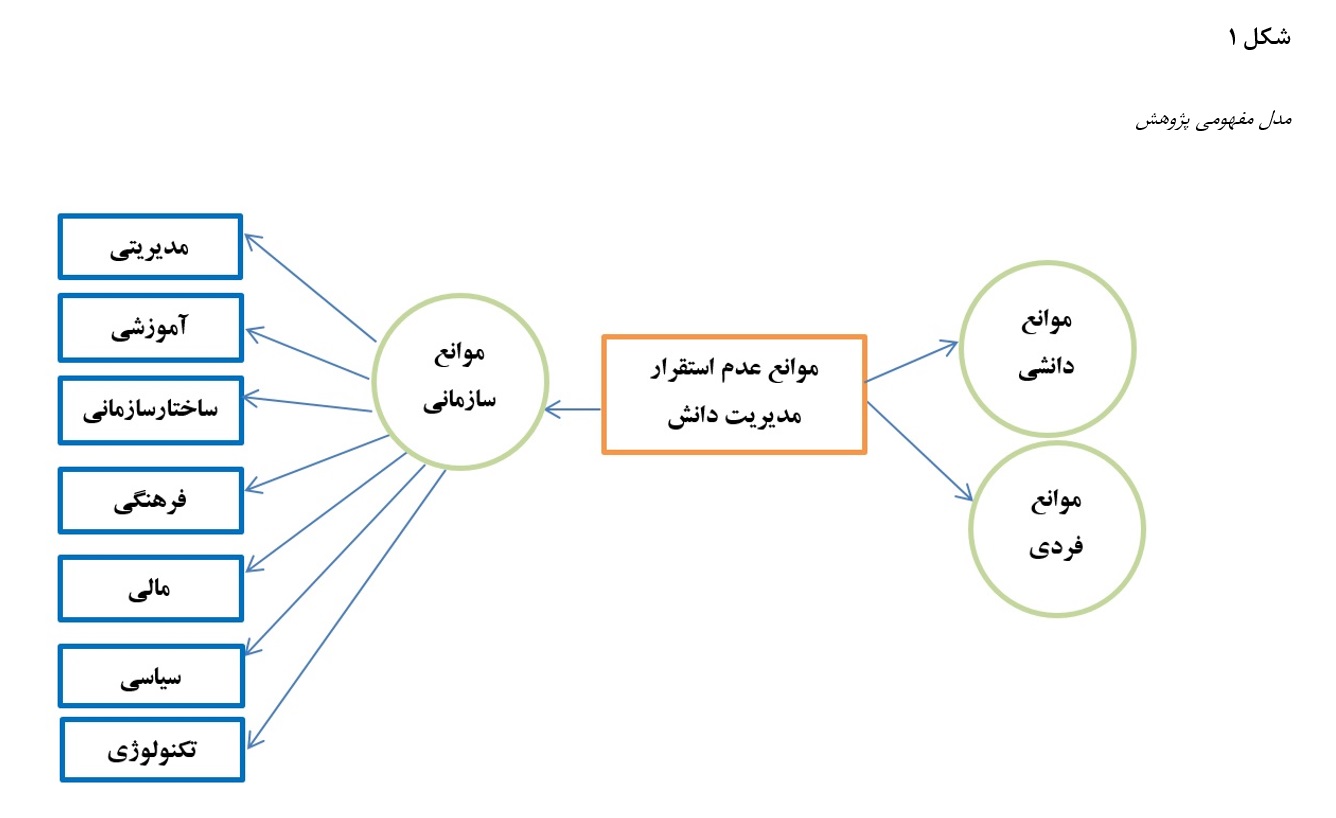شناسایی عوامل عدم استقرار مدیریت دانش در مناطق نفتخیز جنوب
کلمات کلیدی:
مدیریت دانش, موانع دانش, موانع فردی, موانع سازمانی, مناطق نفت خیز جنوبچکیده
هدف این تحقیق شناسایی ابعاد و مولفه های زمینه ای است که بر عدم اجرای مدیریت دانش در مناطق نفت خیز جنوب تأثیر می گذارد. آموزش، مدیریت، فرهنگ، ساختار سازمانی و فناوری مورد استفاده و فرآیند دانش نمونههایی از قابلیتهای سازمانی هستند که باید در چارچوب مدیریت دانش در بخش شرکتهای مناطق نفت خیز مورد ارزیابی و توسعه قرار گیرند. بخش کیفی برای استنباط مدل از روش فراسنتز استفاده کرد. در ابتدا، ادبیات تحقیق برای تعیین عوامل مؤثر بر عدم اجرای مدیریت دانش مورد بررسی قرار گرفت. در ادامه از روش دلفی برای جمع آوری نظرات کارشناسان و متخصصان در خصوص این عوامل استفاده شد. جامعه آماری شامل مطالعاتی در قالب مقاله از سال 2016 تا 2024 با تمرکز بر مؤلفههای مؤثر بر فرهنگ یادگیری، جستجو با کلیدواژههای تعیینشده در پایگاههای معتبر علمی داخلی مانند نورماگز، ماگیران، سیویلیکا، گنج، المنت و پایگاههای خارجی مانند اریک، Science Direct، UET و Google Scholar. در مجموع 260 مطالعه مورد بررسی قرار گرفت و پس از چند مرحله مرور و غربالگری، 120 مقاله انتخاب شد. تجزیه و تحلیل داده های تحقیق با استفاده از روش های تحلیل استنباطی در قالب کدگذاری و تحلیل عاملی سوالات پرسشنامه با استفاده از نرم افزار تحلیل آماری SPSS انجام شد. یافته های پژوهش در کدگذاری باز 128 مولفه عدم اجرای مدیریت دانش را استخراج کرد که در کدگذاری محوری به پنج دسته اکتساب، ایجاد، انتقال، ذخیره سازی و کاربرد دانش تقسیم شدند. علاوه بر این، نتایج مرحله کدگذاری انتخابی، مؤلفههای بهدستآمده را به موانع دانش، فردی و سازمانی طبقهبندی کرد. این تحقیق بر اساس ویژگیها و موانع اجرای مدیریت دانش، آنها را در سه حوزه دستهبندی کرد که میتوان از آنها در طراحی موانع اجرای مدیریت دانش با هدف پرورش و توسعه دانش ضمنی در مناطق نفت خیز جنوب استفاده کرد.
دانلودها
مراجع
Abdelwhab Ali, A., Panneer selvam, D. D. D., Paris, L., & Gunasekaran, A. (2019). Key factors influencing knowledge sharing practices and its relationship with organizational performance within the oil and gas industry. Journal of Knowledge Management, 23(9), 1806-1837. https://doi.org/10.1108/JKM-06-2018-0394
Ali, J., Lodhi, M. S., & Shafiq, M. (2021). Challenges of knowledge sharing within oil & gas sector. Journal of Public Value and Administrative Insight, 4(2), 128-143. https://doi.org/10.31580/jpvai.v4i2.2084
Alves, J. L., Nadae, J. d., & Carvalho, M. M. d. (2022). Knowledge management enablers and barriers: exploring the moderating effect of communication barriers. International Journal of Managing Projects in Business, 15(7), 1091-1122. https://doi.org/10.1108/IJMPB-02-2022-0047
Cegarra-Navarro, J.-G., Jimenez-Jimenez, D., & Garcia-Perez, A. (2019). An integrative view of knowledge processes and a learning culture for ambidexterity: Toward improved organizational performance in the banking sector. Ieee Transactions on Engineering Management, 68(2), 408-417. https://ieeexplore.ieee.org/abstract/document/8732483/
Ghasemi, B., Khalijian, S., Daim, T. U., & Mohammadipirlar, E. (2021). Knowledge management performance measurement based on World-Class Competitive Advantages to develop strategic-oriented projects: Case of Iranian oil industry. Technology in Society, 67, 101691. https://doi.org/10.1016/j.techsoc.2021.101691
Grant, R. M. (2013). The development of knowledge management in the oil and gas industry. Universia Business Review(40), 92-125. https://www.redalyc.org/pdf/433/43328679006.pdf
Mardani, A., Nikoosokhan, S., Moradi, M., & Doustar, M. (2018). The Relationship Between Knowledge Management and Innovation Performance. The Journal of High Technology Management Research, 29(1), 12-26. https://doi.org/10.1016/j.hitech.2018.04.002
Raudeliuniene, J., Albats, E., & Kordab, M. (2021). Impact of information technologies and social networks on knowledge management processes in Middle Eastern audit and consulting companies. Journal of Knowledge Management, 25(4), 871-898. https://doi.org/10.1108/JKM-03-2020-0168
Razzaq, S., Shujahat, M., Hussain, S., Nawaz, F., Wang, M., Ali, M., & Tehseen, S. (2019). Knowledge management, organizational commitment and knowledge-worker performance. Business Process Management Journal, 25(5), 923-947. https://doi.org/10.1108/BPMJ-03-2018-0079
Torres, A. I., Ferraz, S. S., & Santos-Rodrigues, H. (2018). The impact of knowledge management factors in organizational sustainable competitive advantage. Journal of Intellectual Capital, 19(2), 453-472. https://doi.org/10.1108/JIC-12-2016-0143
van Aswegen, M., & Retief, F. P. (2020). The role of innovation and knowledge networks as a policy mechanism towards more resilient peripheral regions. Land Use Policy, 90, 104259. https://doi.org/10.1016/j.landusepol.2019.104259
Veer Ramjeawon, P., & Rowley, J. (2017). Knowledge management in higher education institutions: enablers and barriers in Mauritius. The Learning Organization, 24(5), 366-377. https://doi.org/10.1108/TLO-03-2017-0030
Veer Ramjeawon, P., & Rowley, J. (2020). Enablers and barriers to knowledge management in universities: perspectives from South Africa and Mauritius. Aslib Journal of Information Management, 72(5), 745-764. https://doi.org/10.1108/AJIM-12-2019-0362
Yuan, J., & Li, H. (2023). Research on the standardization model of data semantics in the knowledge graph construction of Oil & Gas industry. Computer Standards & Interfaces, 84, 103705. https://doi.org/10.1016/j.csi.2022.103705
Zaim, H., Muhammed, S., & Tarim, M. (2019). Relationship between knowledge management processes and performance: critical role of knowledge utilization in organizations. Knowledge Management Research & Practice, 17(1), 24-38. https://doi.org/10.1080/14778238.2018.1538669

دانلود
چاپ شده
ارسال
بازنگری
پذیرش
شماره
نوع مقاله
مجوز
حق نشر 2024 تکنولوژی در کارآفرینی و مدیریت استراتژیک

این پروژه تحت مجوز بین المللی Creative Commons Attribution-NonCommercial 4.0 می باشد.










